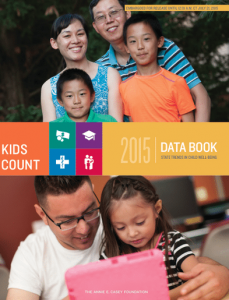South Carolina Improves in Annual KIDS COUNT Rankings of Child Well-Being
July 21, 2015South Carolina has experienced mixed results in educational outcomes. While South Carolina has made recent advances in the Read to Succeed Act, it will be several years of sustained investment before the impacts are seen within this data.
“Education is critically important for future success and family stability,” Williams said. “With education, families have more opportunity to succeed and contribute to reducing the stressors that can lead to child abuse and neglect. We applaud and encourage the continued discussion around children’s access to affordable, high quality early care and education.”
South Carolina’s children continue to struggle in key areas of education and economic well-being. For example:
- 59 percent are not attending preschool;
- 72 percent of fourth graders are not proficient in reading;
- 69 percent of eighth graders are not proficient in math; and
- 27 percent of children live in poverty.
For children of color, the numbers are even more disparate. Only 13 percent of African-American children are reading proficiently by fourth grade and have math proficiency by eighth grade.
Children’s Trust is the KIDS COUNT grantee for South Carolina. The KIDS COUNT Data Book features the latest data on child well-being for every state, the District of Columbia and the nation. This information is available in the KIDS COUNT Data Center, which also contains the most recent national, state and local data on hundreds of measures of child well-being. Data Center users can create rankings, maps and graphs for use in publications and on websites, and view real-time information on mobile devices.
The KIDS COUNT Data Book and South Carolina state profile is available on the Casey Foundation website at aecf.org and on the Children’s Trust website at scchildren.org/KidsCount.
About Children’s Trust of South Carolina
Children’s Trust of South Carolina is the only statewide organization dedicated to strengthening and supporting public and private prevention efforts that keep South Carolina’s children safe. It works to prevent child abuse, neglect and unintentional injuries so every child has the opportunity to thrive in a healthy, nurturing environment. Children’s Trust is home to KIDS COUNT South Carolina, Safe Kids South Carolina, Prevent Child Abuse South Carolina and other programs that deliver on this mission. For more information, visit scChildren.org.













